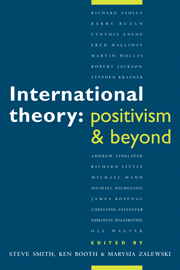Book contents
- Frontmatter
- Contents
- List of contributors
- Preface and acknowledgements
- Introduction
- I Debates
- II Legacies
- III Silences
- IV Openings
- 10 Authoritarian and liberal militarism: a contribution from comparative and historical sociology
- 11 The achievements of post-structuralism
- 12 The contributions of feminist theory to international relations
- 13 The achievements of critical theory
- V Directions
- Index
13 - The achievements of critical theory
Published online by Cambridge University Press: 09 March 2010
- Frontmatter
- Contents
- List of contributors
- Preface and acknowledgements
- Introduction
- I Debates
- II Legacies
- III Silences
- IV Openings
- 10 Authoritarian and liberal militarism: a contribution from comparative and historical sociology
- 11 The achievements of post-structuralism
- 12 The contributions of feminist theory to international relations
- 13 The achievements of critical theory
- V Directions
- Index
Summary
Over the past ten years Marxian-inspired critical social theory has exercised significant influence upon international theory and has emerged as a serious alternative to orthodox approaches to the field. Critical theory has enlarged the parameters of the discipline by showing how efforts to reconstruct historical materialism offer direction to International Relations in the post-positivist phase. The position covered in this chapter, Marxian-inspired critical theory, should be distinguished from post-modern critical theory which displays considerable scepticism towards the emancipatory project associated with Marxism. The relationship between these perspectives is a matter to come back to later. The main aim of this chapter is to consider the achievements of the Marxian branch of critical theory, discuss some of the criticisms which have been levelled against it and suggest areas for further research.
As a strand of social theory and as an approach to international relations, critical theory has four main achievements. First, critical theory takes issue with positivism by arguing that knowledge does not arise from the subject's neutral engagement with an objective reality but reflects pre-existing social purposes and interests. Critical theory invites observers to reflect upon the social construction and effects of knowledge and to consider how claims about neutrality can conceal the role knowledge plays in reproducing unsatisfactory social arrangements. In International Relations, these themes have been crucial elements in the critique of neo-realism and in the gradual recovery of a project of enlightenment and emancipation reworked to escape the familiar pitfalls of idealism.
- Type
- Chapter
- Information
- International TheoryPositivism and Beyond, pp. 279 - 298Publisher: Cambridge University PressPrint publication year: 1996
- 33
- Cited by



